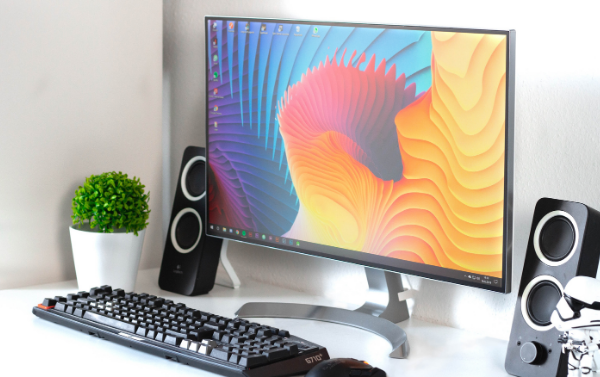Not every PC is built quite the same. For one thing, some cost thousands of pounds, while others cost just a few hundred. What exactly makes the computers you find in the Cyberpower store different from the standard sort you might pick up from a liquidation sale at a nearby office?
Of course, all books have been written on the subject of PCs and how they differ, so we won’t be diving too deep here. What we will do is examine the components which set the typical gaming machine apart from a regular PC.
What sets a Gaming PC apart?
What Monitor do I need for my PC Setup?
Before we get to your Gaming PC, let’s think about the display. If you’re gaming, then you’ll need a monitor of a certain size and calibre. This might mean something that’s twenty-seven inches or above, which comes with a high refresh rate, and which offers features like adaptive sync. Coming in the form of G-sync for Nvidia graphics cards and Freesync for AMD ones, this technology allows the monitor to adjust the refresh rate to match the framerate, thereby eliminating tearing and helping to keep everything butter-smooth.
You might even have two of them. This can be useful in streaming settings, where you want to keep an eye on the chat while still having a dedicated screen for gameplay. Of course, the more pixels you’re pushing, the more graphics horsepower you’ll need.
Do you need a Graphics card for your PC?
Rendering a modern game requires a dedicated graphics card. You can think of these as computers within computers. They’re designed to slot onto your motherboard, in such a way that the ports are exposed around the back of the machine. There are two major manufacturers in this arena: Nvidia and AMD. The former tend to offer more particular features, the latter represent better value for money.
You don’t strictly need a discrete graphics card in order to run a lot of programs. Even some games can get by with the integrated graphics built into a modern CPU. But the performance difference is mostly night-and-day: if you’re gaming, you need a discrete graphics card.
Peripherals
While computational power might matter a great deal, arguably just as important are the input devices you’ll be using to actually interact with the game world.
Gaming PC Mice vs Regular PC Mice
Gamers require a higher calibre of mouse than most PC users. When we want to open a document, we click on the icon. There isn’t any real-time pressure involved, and since the icon is nicely sized, there isn’t any real chance of us missing and opening another document accidentally (unless we’re having an incredibly frantic day).
When you’re gaming, things are slightly different. Rather than opening a document, you’re shooting an opponent in the head or building a radar dome. Every millisecond counts, and precision matters. If you fail, then you might lose your opportunity. They might even turn around and shoot you!
Consequently, gaming mice need to be incredibly accurate. The headline figure here is the dots-per-square-inch (DPI). Look for something in the thousands. If your mouse comes with extra buttons, you can map the special commands in your favourite games there, so you don’t have to waste energy moving your hand from one side of the keyboard to the other.
How do Gaming PC Keyboards differ from Regular PCs?
Perhaps as important are the keyboards you’re using. Mechanical keyboards, complete with RGB lights, tend to be popular choices here. When you press a key, you want to be absolutely sure that it’s pressed. There are quite a few choices around, here – you might go for different throw distances and different levels of ‘clackiness’.
Aesthetics
Gaming PC cases, much like sports cars, are recognisable on sight. They come equipped with fins, loads of fans, and brightly coloured lights. Plus, they tend to be massive, so as to accommodate all of the stuff inside.
It’s easy to sneer at some of the case designs being pumped out today. And we’re not against sneering (we are, after all, members of the Glorious PC Gaming Master Race) – but it’s worth saying that having a few RGB LED strips around the room can have benefits that go beyond simply looking cool. They might help you to adopt the right frame of mind when you’re trying to be productive, or help you to chill out when you want to unwind. Lots of the stuff in your home is there just for decoration – so why not make your PC case pleasant to look at? Custom made PCs can be tailored to your precise needs, including aesthetic ones.
How might a gaming machine make regular use easier?
Gaming PCs offer certain features which you might notice in everyday use, too. A monitor with a high refresh rate will make browsing windows seem that much smoother and faster. Move the mouse across the screen at 144hz and it has a certain level of zip. Go back to 60hz and you’ll feel the difference immediately.
The same applies to super-fast storage NVMe storage drives. While they will cut down those loading times in your favourite games, they’ll also make the general experience of using Windows that much more joyous.
Finally, a generous RAM complement will make life easier, especially if you’re spending a lot of time online. If you have dozens of tabs open in your browser, then you’ll need enough RAM to support them all. If you have loads of super-fast RAM, this isn’t something that you’ll need to worry about.
If you’re going to be spending much of your day teleconferencing, then having a massive screen with a high resolution will make it that much easier to see everyone. The same goes for your headset, microphone, and other gaming peripherals. You’ll get decent mileage out of them during the day, and still benefit from them when you’re enjoying a late-night Starcraft session.
What machine do I need for my purposes?
We could go on endlessly about the variables that mark a gaming PC from a bog-standard one. But if you can’t get your head around all the variables (or don’t want to, because your time and energy is valuable), why not pick out one of our pre-built systems? They’re built with various gaming priorities in mind, and they’ll all run basic office programs fantastically, too. If you’d like to learn more, about how Gaming PCs differ from Regular PCs, you can check out our PC Buying Guide to find out more.

